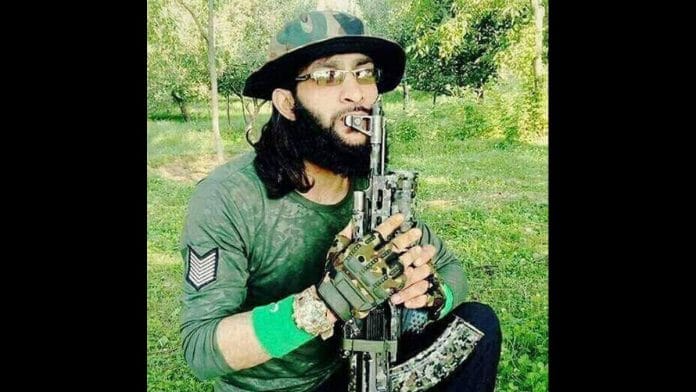Zeenat-ul-Islam, a top Al-Badr commander, is believed to have been involved in militancy since 2008.
New Delhi: The top commander of the terror group Al-Badr was killed along with another terrorist in an encounter with security forces in the Katpora area of south Kashmir’s Kulgam district Saturday, the Indian Army confirmed late in the evening.
Zeenat-ul-Islam was one of the three most-wanted terrorists for security forces in Kashmir. The second slain militant has been identified as Shakeel Ahmad Dar alias Faisal of Chilipora, Shopian, sources said.

Considered an improvised explosive device (IED) expert, Zeenat is believed to have been involved in militancy since 2008, and among the longest surviving local terrorists.
A key terror recruiter in the Valley, Zeenat was among the accused in the 23 February 2017 Shopian attack in which three Army personnel and one civilian woman were killed.
Sources said Saturday’s encounter started as the troops of 34 Rashtriya Rifles, the 18 battalion of the Central Reserve Police Force (CRPF), and the special operations group, Kulgam, arrived in Katpora for a cordon-and-search operation following a specific input about the presence of Zeenat and other terrorists in the area.
The security forces had also brought Zeenat’s father to the encounter site to appeal to him to surrender, the sources added, but the terrorists opened fire when they sensed the team was closing in on them.
Also Read: Record 247 terrorists killed in Kashmir this year, security forces to keep up the pressure
Identity confirmed after hours
Within minutes of the encounter, after 6 pm, security agencies are believed to have picked up “chatter” about Zeenat having been killed.
By about 9.30 pm, a number of WhatsApp forwards were being shared that hailed Zeenat as a martyr, including one that featured a song sung by the son of a Pakistani soldier at his funeral.
In the past too, terror groups have come out with such propaganda material within hours of a high-profile terrorist’s death.
However, the Jammu & Kashmir Police, the Army and the CRPF, along with the central security agencies, remained tightlipped about the identity of the two terrorists for several hours after the operation.
Even the official statement released by police said the identity of the duo was yet to be ascertained.
It was only later that it was confirmed that one of the dead had been identified as Zeenat, with the second terrorist named as well.
Sources said that security forces were initially reluctant to confirm the identity of the two because of two reasons.
One was that he had escaped previous encounters, including one occasion where he donned a burqa to flee, and they wanted to be certain about the identity before making any announcement.
The second reason was that they feared that the news of his killing might create a law and order problem, like the death of Hizbul Mujahideen commander Burhan Wani did in July 2016 and long afterwards. After Saturday’s encounter, internet services were reportedly suspended in Kulgam.
Big blow to terror machinery
The killing of Zeenat is a huge setback to the terror infrastructure in Kashmir.
Sources said that he had been behind a series of deadly attacks in Kashmir against not just security personnel, but also civilians.
Zeenat, a Bachelor of Arts graduate, was arrested for the first time in 2008 and booked under the Public Safety Act (PSA) for being a member of Al-Badr. He is said to have worked as an overground worker for terror groups and helped their members with logistics support, including food.
According to available information, he initially worked with his father after his release in 2012.
Three years later — a married man by then — he is believed to have joined the Lashkar-e-Taiba, the Pakistan-based Hafiz Saeed-led outfit that carried out 26/11.
Also Read: More killings, greater alienation: How the situation in Kashmir is slipping out of hand
Operations intensified
Security forces have intensified their operations in Kashmir of late amid a spurt in militant activity, and 2018 saw a record number of terrorists being killed.
On Thursday, Indian Army chief General Bipin Rawat had said the forces were “gradually” moving towards bringing the situation in J&K under “better control” and following a policy of “hard and soft approach”.
“We are following a hard and soft approach. Both need to be done,” he added.






